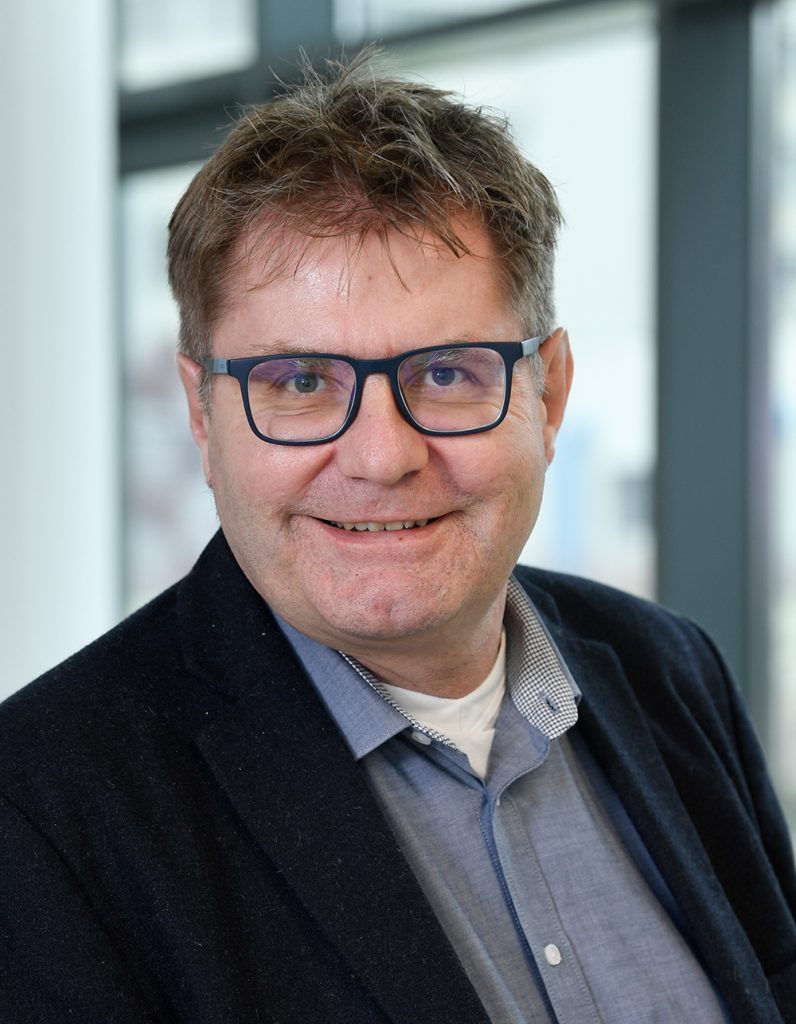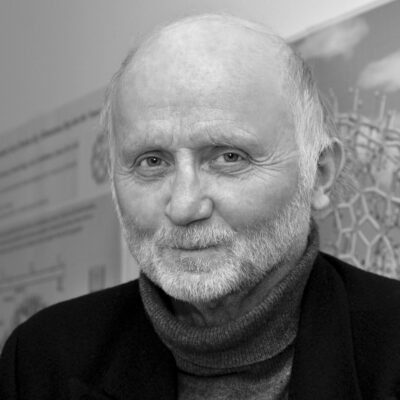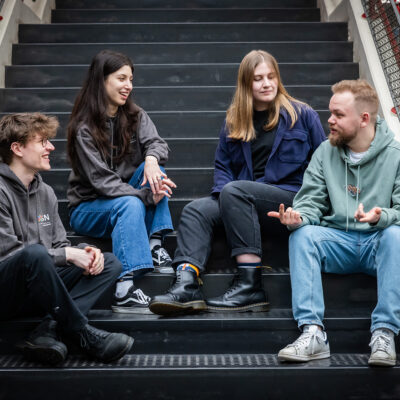Um Tumore zu behandeln, setzen Ärztinnen und Ärzte hauptsächlich Operationen, Strahlen- und Chemotherapie ein. Ein neues Projekt der Universität Bielefeld und 14 europäischer Partner untersucht in den kommenden vier Jahren zielgerichtete Krebstherapien. Die Idee: Spezielle Moleküle spüren Tumorzellen im Körper auf und geben einen Wirkstoff ab, der dafür sorgt, die wuchernden Zellen zu beseitigen.
15 Doktorandinnen und Doktoranden werden in dem Forschungsnetzwerk „Magicbullet::Reloaded“ zusammenarbeiten. Für das Projekt kooperieren Universtäten, Forschungsinstitute und Industrieunternehmen. Die Europäische Union fördert das Netzwerk mit rund vier Millionen Euro.

Mit dem Projekt setzen die Wissenschaftlerinnen und Wissenschaftler die Arbeit des Netzwerks „Magicbullet“ fort. Von 2015 bis 2018 entwickelte das Netzwerk die wissenschaftlichen Grundlagen für zielgenaue Krebsmedikamente, die Peptid-Moleküle als Transporter für den Anti-Tumor-Wirkstoff nutzen.
Prototypen für künftige Therapien
„In dem neuen Netzwerk wollen wir diese Forschung ausweiten“, sagt Professor Dr. Norbert Sewald von der Fakultät für Chemie und dem Centrum für Biotechnologie (CeBiTec) der Universität Bielefeld. Der Chemiker koordiniert nach „Magicbullet“ auch „Magicbullet::Reloaded“. Künftig befassen sich die Wissenschaftlerinnen und Wissenschaftler nicht mehr ausschließlich mit Verbindungen aus Peptiden (kleinen Eiweißmolekülen) und Anti-Tumor-Wirkstoffen. „Wir erforschen nun zusätzlich zu Peptiden weitere kleine Moleküle, die mit Wirkstoffen verbunden werden und Tumorzellen zielgenau ansteuern“, so Sewald. Der zweite Schwerpunkt des neuen Projekts liegt auf den Wirkstoffen: „Wir konzentrieren uns dieses Mal auf Medikamente, die das Immunsystem dazu bringen, Tumore als schädlich zu erkennen und sie zu beseitigen.“
„Mit einer solchen Art von Medikamenten können Tumore potenziell schonender behandelt werden als zum Beispiel mit der konventionellen Chemotherapie“, sagt Dr. Marcel Frese, Mitarbeiter in Sewalds Arbeitsgruppe. Frese begleitet die Umsetzung von Magicbullet::Reloaded. „In der Chemotherapie werden gewöhnlich zellschädigende Wirkstoffe eingesetzt. Sie sollen die Krebszellen vergiften, haben aber den Nachteil, dass sie auch die gesunden Zellen schädigen.“
Das neue Projekt verknüpft Grundlagen- und Anwendungsforschung. „An den beteiligten Universitäten und Forschungsinstituten entwickeln wir Prototypen für künftige Tumortherapien“, sagt Norbert Sewald. „Diese Prototypen werden von den beteiligten Industriepartnern in vorklinischen Studien erprobt. Unsere ersten Ergebnisse aus Magicbullet sind bereits sehr vielversprechend. Es ist aber noch ein sehr weiter Weg bis in die Klinik und wir können nicht erwarten, dass unsere Verbindungen bereits in den nächsten Jahren auf den Markt gelangen.“
Partner aus sechs Ländern
Magicbullet::Reloaded vereint Forschende aus der organischen und medizinischen Chemie, Tumorbiologie und Pharmakologie. In dem neuen Konsortium kooperiert die Universität Bielefeld mit Partnern aus sechs Ländern. Beteiligt sind acht Universitäten: die Eötvös-Loránd-Universität Budapest (ELTE) in Ungarn, die ETH Zürich (Schweiz), Newcastle University (Großbritannien), die Technische Universität Darmstadt, die Universität Helsinki (Finnland), die Universität Insubrien (Italien), die Universität Mailand (Italien) und die Universität zu Köln. Als Forschungsinstitute wirken das Fraunhofer-Institut für Toxikologie und Experimentelle Medizin in Hannover und das Nationale Institut für Krebsforschung OOI (Ungarn) mit. Außerdem beteiligen sich vier Pharmaunternehmen: Exiris (Italien), Heidelberg Pharma (Deutschland), Philochem AG (Schweiz) und Takis Biotech (Italien). Zusätzliche Unterstützung erhält das Netzwerk von den assoziierten Industriepartnern Bayer (Deutschland), Italfarmaco (Italien) und Kineto Lab (Ungarn).
Das Forschungsrahmenprogramm der EU fördert Magicbullet::Reloaded als Marie Skłodowska European Training Network (Europäisches Ausbildungsnetzwerk für den wissenschaftlichen Nachwuchs), Förderziffer: 861316. Ziel solcher Promotionsnetzwerke ist es, herausragende Doktorandinnen und Doktoranden in strukturierter Weise innerhalb von exzellenten Forschungsvorhaben auszubilden. Der Name „Magicbullet“ bezieht sich auf ein Konzept des Nobelpreisträgers Paul Ehrlich (1854-1915), von dem die Idee der zielgerichteten Wirkstoffe stammt und der diese als „Zauberkugeln“ bezeichnete.
Doctors treat tumours mainly through surgery, radiotherapy, and chemotherapy. Over the next four years, a new project of Bielefeld University and 14 European partners will be studying targeted cancer treatments. The idea is that special molecules will track tumour cells in the body and then deliver an active agent that ensures that the cancerous cells are removed. Fifteen doctoral students will be working together in the ‘Magicbullet::Reloaded’ research network. The project is a cooperation between universities, research institutes, and industry. It is being funded by the European Union with a budget of around four million euro.
In this project, the scientists are continuing the work of the ‘Magicbullet’ network. Between 2015 and 2018, this network developed the scientific basis for targeted cancer drugs that use peptide molecules to transport the anti-tumour agent.

‘What we want to do in the new network is to take this research further,’ says Professor Dr Norbert Sewald from Bielefeld University’s Faculty of Chemistry and the Center for Biotechnology (CeBiTec). Following on from ‘Magicbullet’, the chemist is now coordinating ‘Magicbullet::Reloaded’. In future, the researchers will not just be working exclusively on peptide conjugates (tiny protein molecules) and anti-tumour agents. ‘In addition to the peptides, we shall be directing our research towards further small molecules that can be combined with active agents and target tumour cells,’ according to Sewald. The second focus of the new project will be on the active agents: ‘This time, we are concentrating on drugs that can enable the immune system to recognize tumours as harmful and remove them.’
‘With this kind of drug, we can potentially treat tumours less aggressively than with, for example, conventional chemotherapy,’ says Dr Marcel Frese, a member of Sewald’s research team. Frese is working on implementing Magicbullet::Reloaded. ‘Chemotherapy generally applies active agents that damage cells. They should poison the cancer cells. However, the drawback is that they also damage healthy cells.’
The new project links together both basic and applied research. ‘At the universities and research institutes in the project, we are developing prototypes for future tumour therapies,’ says Norbert Sewald. ‘Our industrial partners will then test these prototypes in pre-clinical studies. The first results gained from Magicbullet are already very promising. However, we still have a very long way to go before clinical treatment can proceed, and we cannot expect that our conjugates will be on the market in the next few years.’
Magicbullet::Reloaded brings together researchers from organic and medical chemistry, tumour biology, and pharmacology. In the new consortium, Bielefeld University is cooperating with partners from six countries. Eight universities are participating: the Eötvös Loránd University (ELTE) in Budapest (Hungary), the ETH Zurich (Switzerland), Newcastle University (Great Britain), the Technische Universität Darmstadt (Germany), the University of Helsinki (Finland), the University of Insubria (Italy), the University of Milan (Italy), and the University of Cologne (Germany). Two research institutes are participating: the Fraunhofer Institute for Toxicology and Experimental Medicine in Hanover (Germany), and the National Institute for Cancer Research OOI in Budapest (Hungary). Four pharmaceutical companies are also involved: Exiris (Italy), Heidelberg Pharma (Germany), Philochem AG (Switzerland), and Takis Biotech (Italy). The network is receiving additional support from the associated industrial partners Bayer (Germany), Italfarmaco (Italy), and Kineto Lab (Hungary).
The EU Research Framework Programme is funding Magicbullet::Reloaded as a Marie Skłodowska-Curie European Training Network, ID: 861316. The goal of such training networks is to give structured training to outstanding doctoral students within the framework of excellent research projects. The name ‘Magicbullet’ comes from the Nobel Laureate Paul Ehrlich (1854–1915). He first suggested the concept of targeted agents that he also called ‘magic bullets’.




